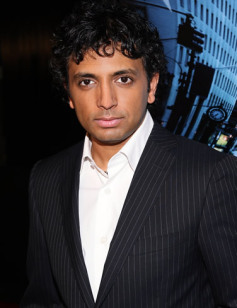
M. Night Shyamalan, at his best, has given us twisty horror (The Sixth Sense) and possibly the best superhero origin story so far (Unbreakable). While his love of twist endings may have led to some (much) less successful movies, he has always produced films that weren’t pale imitations of what was already out there.
His new event series for FOX, Wayward Pines (Thursdays, 10/9C) – based on the novels by Blake Crouch (which I have not read – premieres tomorrow night and, while it might evoke echoes of The Prisoner or Twin Peaks, is a different animal completely. Recently Shyamalan spoke with a group of bloggers/journalist about the event series and why he decided to do it. He was completely charming (check out the wexchange with the moderator at the end of the call) and engaging throughout.
Hi. Thanks so much for talking to us today.
M. Night Shyamalan: No problem. It was so wild hearing all the instructions. I was getting all—I was like should I be writing this down? Do I have to hit any buttons here? What’s happening?
Nope, but there’s a lot. I’ve seen the first five episodes and I’m really enjoying this show. It’s great.
Night: Oh, great.
It’s creepy, but it’s great. My first question is how closely did you stick to the books? What did you decide to pull and how did you decide where you wanted to go with it?
Night: Yes. It’s an interesting anamorphous answer to your subject. The normal provenance of a project seems clear. We adapted it from a XYZ book and that’s the end of it. In our case, we had Blake’s first book, which was fantastic, and they wrote the pilot and the information from the first book was basically in the five episodes that you saw, maybe a little bit into the sixth episode that you’ve seen.
The decision to basically get to the reveal midway through the season was something that I felt strongly about, and everybody concurred that we didn’t want to have more the traditional format of tease, tease, tease, tease and then at the very end tell you the answer, because I thought the answer was a very exciting world to live in. Subsequently, as we started to write episodes, Blake continued to write books. Book 2 came out well into our shooting and Book 3, so he started to evolve the world. So to some extent, we were parallel creating our world post Episode 5-6.
Thank you for doing this. I’ve been enjoying the show. I haven’t seen five episodes yet, but I’ve been enjoying the show. What turned you on to Wayward Pines in the first place? What made you want to do this project? What was it about it that turned you on?
Night: It’s a really wonderful question. I’ve been hesitant about doing things other than movies for a while and very tempted to do something on TV. It was a tentative ride, got to the altar a few times and found a reason to not do XYZ projects. I felt a little bit like maybe I will never feel the clarity of the decision that I feel when I do most of my movies, when I do an original that I’ve written – a thriller or something. I always feel a great clarity and a commitment to how I want to put in this time. I can’t wait to do this for the next year and a half to two years and I wondered whether I would have that clarity.
Then just when I was doubting all of that—and it’s been a while, maybe a year and a half of trying to find something that felt right to start the journey in TV, and then the pilot for Wayward Pines came across my desk and I’m really, really lucky that it did and lucky they chose me as their first choice and just that they thought of me and it just fit so well with what I was interested in. I was interested in doing dark material and doing, for me, a dark humor attached to that material and certainly the pilot had that approach. As it entered this world of mystery and stuff and suspense it took a dark irreverent tone to it.
If you’ve seen the trailer to my new movie for Universal, that also has very inappropriate dark humor throughout. I’m a big fan of that and I’m in that headspace, so this pilot really spoke to me and it was such a great puzzle and a great mystery. And, ultimately, when you find out what’s going on, I thought meaningful. So it was a really easy decision.
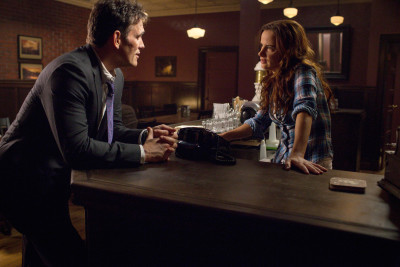
WAYWARD PINES: Ethan Burke (Matt Dillon, L) meets Beverly (guest star Juliette Lewis, R) in Wayward Pines on FOX. ©2014 Fox Broadcasting Co. Cr: Liane Hentscher/FOX
Obviously, there’s only ten episodes to this run. What do you see as the drawbacks and the benefits of only having ten episodes rather than anticipating a second season or knowing you have to fill a full twenty-two episode order?
Night: There’s not a ton of negatives, I’ve got to be honest with you. You get a certain group of people that wouldn’t necessarily be interested in doing an open-ended longform type of storytelling like Matt Dillon and others that were willing do a project if I said can you come and work for X amount of months and do one season for me. That’s a benefit.
The beautiful thing about TV right now is that the form is very pliable. When it was you had to do twenty-four episodes it was a tough thing to fit, and now it went to thirteen and then it went to ten and then you could do eight, like True Detective, and you could basically can do whatever the material dictates and that’s a very beautiful thing. Even as we were deciding what to do, the length of this was supposed to be—it vacillated from thirteen to twelve to ten, and ultimately the decision to not have any vamping episodes—that kind of what we all feel is the telltale trait that they’re running out of material is that if they’re getting repetitive or vamping and going to a side thing because they just need to fill space. You don’t have those kind of problems with a ten-episode series. So really wonderful positives on all fronts.
I’m trying to think of a negative. If the negative is we love this show and want to continue it, it’s a decision that can be made in the future. But that wasn’t the goal. And for me, especially, being involved with the show it would be something that would have to be made later and not we have to hit this target and we don’t know what we’re doing for that target. So a lot of positives for this format. And including me, I don’t know if I would have been ready to say I wanted to do an open-ended show as my first show. I’m not sure.
Thank you. Thank you for taking the time to talk to us. I really appreciate it.
Night: Thank you. This is so wild. I’ve never done one of these. Usually I’m at a table with all you guys around me so this is wild. I’m much funnier in person. I just want you all to know that. You can just add 20% to the charm factor there. Even if it’s 0 it’s 20% in person, so there you go.
You’re quite engaging. Don’t worry about it. Riveting. There’s so many things I’d like to say, but since we’re limited for questions, I did want to talk to you about your casting on this. Melissa Leo especially. Overall casting is phenomenal. So many great actors play the intense characters. She really struck me, especially in the premiere. Because ever since Nurse Ratched, you haven’t really seen a nurse that gave you the chills so quickly. Tell me a little about the casting process for this run, because really you couldn’t of handpicked better people to play these roles.
Night: You know, you’re very astute. I don’t know if it was just a coincidence or a testament to your acumen. We’ll give it as a testament to your acumen that you mentioned Melissa. Because really for me, I’m always a bit—casting for me is the most critical thing. I’m always confused at the onset. I have my aspirations and my agendas and oh, I’d love to work with this person and that person and those kinds of things can be false gods sometimes. They can lead you down to the wrong path. There’s a moment where you feel peace and that peace comes from when you know the personality of the entire cast put together. Because basically, you guys as an audience member are going on a date or something, say a relationship with the cast as whole, what is that personality of their cast as a whole?
So the first person was Matt. We signed on Matt and he was literally a no-brainer. Then I was, to be honest, a little confused for a second about how to cast this thing. I can’t remember who mentioned Melissa first. It might have even been Matt. I’m not sure and literally when I heard the name—the second I heard the name I went oh my God, I know exactly how to cast this show. Because the role that, for me, I was worried about was Nurse Pam because it needs to be handled really deftly, otherwise it becomes a caricature.
I was struggling with the tone of the cast and then when I heard her name I was like oh my God let’s get her, let’s get her, let’s please see if we can get her. And then when we got her, I went wow, now I know what the rest of this cast is. This is the Melissa Leo version of Matt Dillon and those two in a movie, I know exactly how to cast this. This is an East Coast/New York independent movie. So then Terrence came on and Carla and Toby and Juliette, and just one after the other. I just knew the tone of how to cast it and luckily for us everybody said yes. It was a confluence of many, many things that got us this incredible cast. Very lucky. Casting is a—the casting Gods have to be with you.
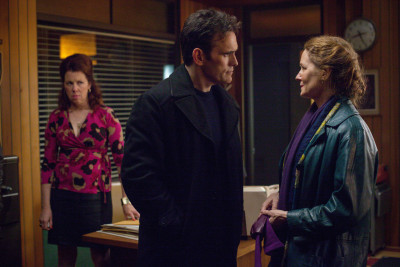
WAYWARD PINES: Pictured L-R: Siobhan Fallon Hogan, Matt Dillon and Melissa Leo. WAYWARD PINES is set to premiere Thursday, May 14 (9:00-10:00 PM ET/PT) on FOX. ©2015 Fox Broadcasting Co. Cr: Ed Araquel/FOX.
I can’t wait to see what happens next. Very riveting. I was wondering was it just the ten episode thing that made you decide to do TV for a change instead of movies? Was it [indiscernible]?
Night: The year and a half prior to Wayward was the sense of getting inspired by what was going on in television. Since then even more so this sense of storytelling being led in—if you’re looking at the two mediums of film and TV—and we’re going to greatly stigmatize the two fields for a second just for simplicity—in film, in mainstream cinema right now there’s a great movement towards marketability and a lack of reverence for resonance, storytelling resonance and tone. Marketability is definitely the primary factor looked at when assessing movies and deciding which movies to make and those kind of things.
In television, which used to have marketability as its sole God, as its sole criteria metric, because it had to have X amount of eyeballs on this day to sell detergent or whatever it was it came from and cable and all of this stuff started moving the metric towards resonance. It wasn’t about how many people were watching Mad Men. It’s how many people are talking about Mad Men, so that I make sure I put AMC on my cable package or whatever.
So it started to change the metrics of what the product needs to be. And as you started to see storytelling swinging over to there you started to have filmmakers, and I’d like to put myself in that category, who are driven towards tone first and characters first. So there’s a great want and desire now in television and as you can see even in network TV now for resonance. Please make it sticky. Make it so as we are changing channels you have to stop on this channel because it’s being told in an unusual way. It’s disruptive in that manner. Their desire for that kind of storytelling started to attract me and I would love that.
And then selfishly for me, because I write my films, it’s a big gap between movies to me, talking to my audience and having an opportunity to tell stories to an audience. So for me making a thriller, for example, it takes me eighteen months to two years to tell a story to the audience and nowadays that’s an eternity, right? A couple rounds of that and a whole generation has gone by. This is a great opportunity for me to tell more stories in between the movies and hopefully develop a strong broad relationship with them during that time, so they can get to know the stories that interest me and I can get to know their tastes as well. On a lot of fronts it feels like a very complementary thing to do.
It seems like during the past few years we’ve seen an uptake of the mysterious, strange, scary, thriller kind of TV shows. What do you think is responsible for that?
Night: I wonder—it’s funny as you say that. I’m trying to think—it’s always been there I guess, but perhaps the format of a mystery just naturally leans towards tune-in and find out what happens next kind of agenda on television, and there’s great storytellers that have done great mysteries. Lost is probably a seminal one, JJ’s show, and X-Files back in the day. There’s all these seminal stories of dark, mysterious, weird stuff. As you know, that’s my particular area of fondness.
Right.
Night: I try to make dramas that have the fancy clothes of the genre on them. So very kind of a mixture of those two. And that instinct to make drama/genre it feels very much the appetite of what audiences want on television.
I was curious if you could tell us a little bit about what you feel will resonate the most with viewers. I think it’s much more terrifying that this is based in reality.
Night: Say this one more time. What was the first part of the question? I didn’t hear the first part.
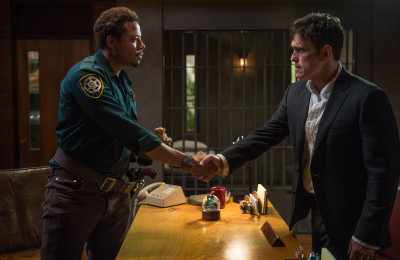
WAYWARD PINES: Ethan Burke (Matt Dillon, R) meets Sheriff Arnold Pope (Terrence Howard, L). @2014 Fox Broadcasting Co. Cr: Ed Araquel/FOX
What are a few reasons that you feel the series will resonate well with the viewers?
Night: Okay, just one of a few reasons… I do believe that it has, hopefully, a cinematic quality to it. I hope. And by that I mean maybe an attention to the camera work and a pacing that might be more akin to what you might see in film. Certainly the cast in general was a cast that you might see more in film. It’s a giant, giant idea. It’s a big idea. It’s like one of those Jurassic Park kind of ideas and I can’t take any credit for that. That’s all Blake. And I’m super lucky to be able to be the one to shepherd it to the audiences. You’re lucky to come across big ideas like that that are both human and gigantic at the same time.
I think our format is really unusual. It excited me in making it. I wasn’t once like oh, we’re making this show still? The thing that I think is really amazing for audiences in that the show changes genres halfway through the season. I don’t even tell you what genre you’re watching for a long time and that’s exciting. And the kind of storytelling I love. Which is you can sense the hand of the filmmakers and so you trust them and you’re going to go somewhere but you don’t necessarily know where you’re going but you know you’re confidently being held.
I also think that finding out all the answers halfway through the series is an amazing thing I think for audience members. Then to change genres and realize what genre you’re in for the second half, and I can almost argue that it changes into a third genre in the last couple episodes.
What do you get called by the way? Is it Night or something else?
Night: Well, my wife calls me lots of names, but I think we should—Night is fine. Night is fine.
Okay. I have got to say I saw the first five episodes and the fifth one is a real mindblower. You’re right; it seems like it’s going one direction and then when you see the fifth it’s like holy cow, I did not see that coming at all. So it’s really good seeing. What you just said, it really makes me look forward to seeing the last five episodes. My question for you is the show is filmed in I think in 2013, correct?
Night: Yes. I think that—yes, exactly—late 2013 into ‘14.
Yes and it was supposed to air in 2014. What was the reason for the delay? Was it a timing thing where Fox wanted to present it at particular time period? Was there a change in the story?
Night: You know what, it was—you know this is my first time in television, so I didn’t really have the kind of opinion that I would have about a movie saying hey this should be June, this should be September, this should be—it feels like an April thing. It’s newish to me. The way it was expressed to me was because it’s an event series that this slot which they did 24 in is the big slot—it’s like to some extent counterprogramming in a wonderful way.
With all the reality television out there and the summer and all, this would be the big real scripted thing to go and really cause a ruckus. So it was a feeling like this was a homerun swing, to go for it. And then the way they wanted to launch it all on the same day all around the world I’m sure had something to do with it as well. They’ve treated us very special, the show very special and with great confidence.
So that’s a good answer. I didn’t really have any other information other than that and we took full advantage of it too. Of course, they gave me time to fiddle and they sent me the queue, and do this, and how about this, and then of course I’m like can I go pick this shot up? Is it okay if I get this little line from this person? So it benefited everybody and also it gave us a chance to show it to you guys early.
So it feels really good timing-wise now. It wasn’t like we were twiddling our thumbs. It really felt like we finished it and then we started promoting it very beautifully and, hopefully, we’ll find a place where we can find our audience.
I was wondering if you could talk about your movie. You have a movie coming out right, at the end of this year?
Night: Yes. It’s called The Visit for Universal. Super, super excited. It was a wonderful thing. I made a small movie that I went and did—I do all my movies here in Philadelphia—but went and made it myself quietly and my number one choice is Universal and showed it to them and they wanted it and they loved it and then we finished it together. It has been such a fun and wonderful time. I’m really excited for audiences to see that movie. My producer is Jason Blum, a super smart guy, and just had such a great time. I’m really excited about it. I feel super proud about the TV show and the movie. So a fun year, a fun year coming up.
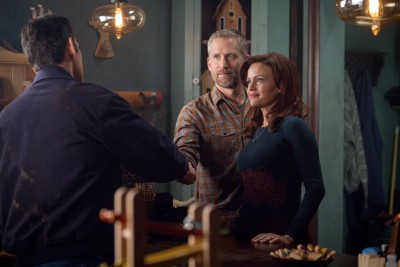
WAYWARD PINES: Kate (Carla Gugino, R) introduces Harold (Reed Diamond, C) to Ethan (Matt Dillon, L) in the “Don’t Discuss Your Life Before” episode of WAYWARD PINES airing Thursday, May 21 (9:00-10:00 PM ET/PT) on FOX. ©2015 Fox Broadcasting Co. Cr: Liane Hentscher/FOX
I’ve seen the first two episodes. I’m going to binge watch the next three. You’re pretty well known for your symbolism in a lot of your films. Would you say that there’s symbolism in Wayward Pines and what is it?
Night: If I told you it would no longer be symbolism. It would be literal. But there’s definitely a lot of hopes in there in terms of the colors and themes. I hired directors to do each of the subsequent episodes. We have a little, kind of like a guide book that we put together as saying this is what the filmic language is, at least the way I was thinking of it. I wasn’t stringent at all with them. I really implored them to make their episodes their own because I hired them for their particular muscles.
Some of them are more muscular than me. Some of them are more kinetic or can handle a particular type of storytelling much better than I can and that’s why I hired them. I didn’t want them to copy me. But I did have kind of a guide book like hey if you used artificial light in this capacity it has this connotation, so that’s one. The way we use light is indicative of what’s going on in the plot.
I’m trying to dance around the answer there. Sorry about that. But I didn’t impose as much as I would do like say on one of my thrillers where I would say the color purple means this. It represents the woman that passed away in Signs for example or something like that, a very specific thing.
But maybe after the show is done, one day you and I will talk and I can tell you more specific this meant this and this meant that. Some I did. I didn’t want to be too suffocating to the filmmakers coming in in terms of hey you’ve got to use this wardrobe or that or this color only. But there were suggestions in the guidebook.
Moderator: Ladies and gentlemen, this conference will be available for replay today after 2:00 p.m. through May 12th at midnight…
Night: You know, you put on that voice. You put on that answering machine voice. That’s amazing how you do that. You don’t talk like that normally, do you, at dinner? You don’t talk like that?
Moderator: I do, actually.
Night: I thought you were doing a performance. It was quite riveting.
Moderator: Thank you. Would you like to give some closing comments?
Night: No. I’m just so excited. Thank you guys for all listening in. We’re very excited about the premiere on Thursday. It was definitely an honor for me to enter television with this cast and crew and with this network and studio. I’m a very, very lucky guy, so I hope you guys enjoy it.
Wayward Pines photos by Liane Hentscher/Courtesy of FOX